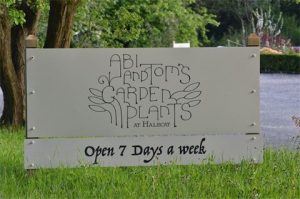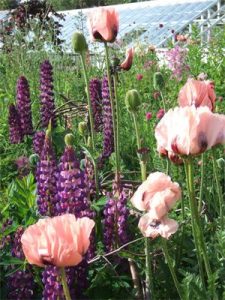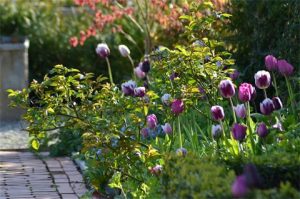Event date: Monday 26th October 2015
Speaker: Tom Attwood
Write-up by Isobel Shaw

© halecatplants.co.uk
Tom Attwood visited HPS-NE to talk about the plant nursery that he and his wife Abi opened in March 2011. Situated on the outskirts of Witherslack and about 6 miles from Grange-over-Sands in an attractive and sheltered situation, the nursery (www.halecatplants.co.uk) had been founded 40 years previously – but it had closed definitively in 2008. By chance, an advert was spotted in Horticulture Week, and Abi and Tom applied successfully for the lease.
For 2 years Abi and Tom devoted their weekends and holidays to restoring the 2 acre plot and restocking with the 700 varieties of plant that they both love and also find to be suitable for their situation. During this time they could expect no income from their new business, and were reliant on savings and on Tom’s income from lecturing and private clients. They were also fortunate to have practical help from both sets of parents and also from some committed volunteers from Newton Rigg Horticultural College, near Penrith.

© halecatplants.co.uk
Having taken on the nursery, Tom first had to evaluate what stock and infrastructure was remaining, and in the case of the infrastructure, why it had been designed as it was. He found that there was a romantic quality to the existing greenhouses although they had been poorly designed, with little ventilation, and the photos he showed us confirmed that these were indeed in a sorry state (as were the polytunnels). Yet the timber was sound and Tom decided to renovate rather than rebuild.
In their first year, the plan was to create more of a level plot, by having much of the stone removed (a problem that many gardeners in the North-East can identify with). Not everything went according to plan – witness the escalating costs of hiring a JCB and skips – but equally they have landed on their feet by being supported by Hardy’s Cottage Garden Plants, who not only gave them a free polytunnel, but also arranged free delivery.
In its heyday the former nursery’s key plants had been hydrangeas, hardy ferns, hardy geraniums and hostas, but when Tom inherited the plants and stock beds, the pots had been neglected beyond redemption and the stock beds, with their unlabelled perennials, were over-run with pernicious weeds. There was no possibility of using existing stock when the nursery opened. By their second year Tom and Abi were ready to begin sowing seeds supplied by Jellito in Germany. Their focus is on herbaceous perennials; for example veronicas, lychnis, geums and foxgloves. Tom says, “We chose plants that we love and are passionate about”. They are influenced by the “Dutch movement” – by Noel Kingsbury and Piet Oudolf – but their aim is to appeal to a broad range of people: to young families just starting out, and equally to older gardeners who want something unusual.

© halecatplants.co.uk
Propagation is managed by sowing 50 varieties at 2-week intervals, using heat mats to aid germination, and moving the mature plants out of polytunnels into the garden to avoid lush growth which is prone to slug damage. From June onwards the greenhouses are too warm for herbaceous perennials, so they are used as giant cold frames in the winter months, e.g. for dahlias and cannas, but as they are South-facing they catch what winter sun there is. Benches have been installed to display plants, which are grouped by type or according to the conditions they need: e.g. grasses, alpines, plants for late summer colour or for shade. Everything that is sold at Halecat has been propagated by themselves, and each year Abi prepares a fresh set of illustrated, detailed labels. After 3-4 years of spraying and digging, the stock beds are now in use to display the plants that they sell to best advantage.
Now that they have become an established nursery, Abi and Tom are looking for ways to entice more customers to visit the garden. One initiative has been to provide tulip displays in the stock beds, to complement the existing perennials. They are also looking for key audiences, such as visitors to the Holker Festival at Holker Hall, where they have been presented with a number of awards.
Tom gave a lively and interesting talk, with beautiful photos of his range of plants, and afterwards Hardy Planters had the opportunity to buy from a selection of hardy perennials and shrubs. Good, colourful foliage was much in evidence, with a lovely, delicate heucherella particularly catching my eye, as well as some unusual pittosporums.
